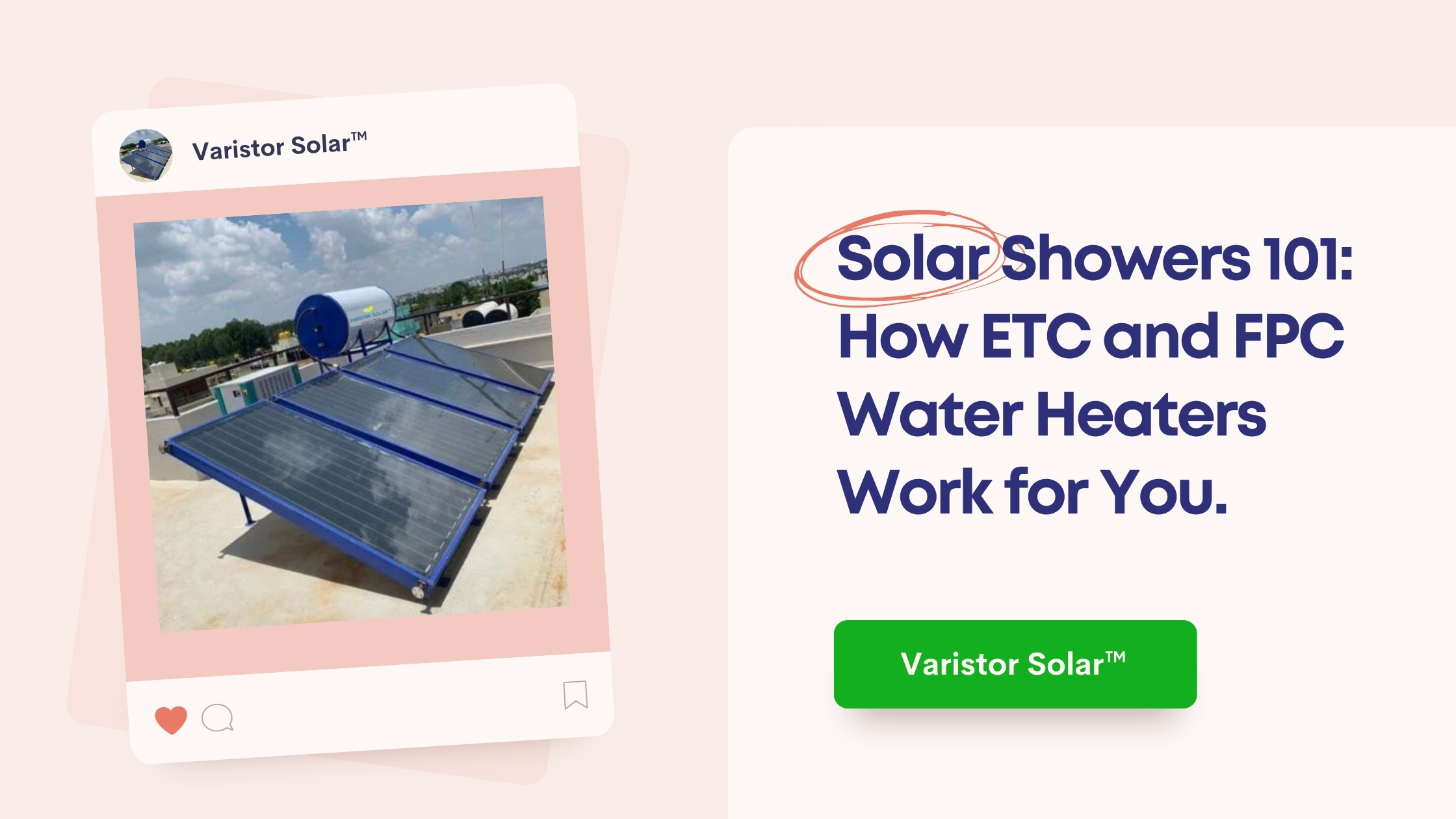
Varistor Solar is dedicated to empowering individuals, businesses, and communities with the transformative power of solar energy. We believe in a brighter, cleaner future and are committed to making sustainable living accessible to everyone.
+91-9113690456
Email: sales@varistorsolar.com
Varistor Solar
NO 40/C, KALKERE VILLAGE,12TH MAIN, NRI LAYOUT,Ramamurthy Nagar, Bangalore North,Bangalore- Karnataka, 560016
Introduction:
In the pursuit of sustainable living and eco-friendly practices, solar energy has emerged as a frontrunner. Among the various applications of solar power, solar water heaters stand out as a practical and efficient solution. In this blog post, we will delve into the workings of Evacuated Tube Collector (ETC) and Flat Plate Collector (FPC) solar water heaters, shedding light on how these marvels of technology harness the abundant energy radiated by the sun.
Understanding Solar Water Heaters:
Solar water heaters are ingenious devices designed to utilize sunlight to heat water for various domestic and industrial purposes. The two primary types, ETC and FPC solar water heaters, differ in their design and functionality.
Evacuated Tube Collector (ETC) Solar Water Heater:
ETC solar water heaters consist of a series of cylindrical glass tubes, each housing an absorber tube. The outer glass tube is transparent, allowing sunlight to pass through, while the inner tube is coated with a highly absorbent material. The air between the tubes is evacuated to create a vacuum, minimizing heat loss.
How it works:
-
Absorption of Sunlight: When sunlight strikes the outer surface of the transparent tube, it passes through and is absorbed by the selective coating on the inner tube.
-
Conversion of Solar Energy to Heat: The absorbed solar energy is converted into heat, raising the temperature of the fluid (usually water or a water-antifreeze mixture) circulating through the absorber tube.
-
Heat Transfer: As the fluid gains heat, it rises to the top of the tube, creating a natural convection current. This hot fluid is then transferred to a storage tank for later use.
-
Continuous Circulation: The process of absorption, conversion, and heat transfer continues as long as there is sunlight, providing a steady supply of hot water.
Advantages of ETC Solar Water Heaters:
- Efficiency: ETC systems are highly efficient, even in low-sunlight conditions.
- Low Maintenance: The design minimizes the risk of scaling or corrosion, reducing maintenance requirements.
- Durability: ETC systems are known for their robustness and long lifespan.
The Best Solar Water Heater in India:
In the vibrant market of solar water heaters in India, finding the best one can be challenging. However, the efficiency and reliability of ETC solar water heaters make them a popular choice. When searching for the best solar water heater in India, consider the ETC variant for its proven performance and durability.
Flat Plate Collector (FPC) Solar Water Heater:
FPC solar water heaters, as the name suggests, consist of a flat, rectangular plate with an absorber layer. This absorber plate is typically made of materials with high thermal conductivity, such as copper or aluminum. The plate is enclosed in an insulated box with a transparent cover, usually made of glass or polycarbonate.
How it works:
-
Absorption of Solar Radiation: Similar to ETC, the absorber plate of an FPC solar water heater absorbs solar radiation.
-
Heat Transfer to Fluid: The absorbed solar energy heats the fluid (usually a mix of water and antifreeze) flowing through pipes or channels attached to the absorber plate.
-
Conduction of Heat: The heated fluid is then conducted to a storage tank, where it is stored for later use.
-
Usage of Hot Water: Whenever hot water is needed, the preheated fluid from the storage tank is drawn and circulated through the system, ensuring a constant supply of hot water.
Advantages of FPC Solar Water Heaters:
- Versatility: FPC systems can be used in a variety of climates and are suitable for residential and commercial applications.
- Cost-effectiveness: FPC systems are often more affordable than ETC systems, making them a popular choice for budget-conscious consumers.
- Easy Installation: The simple design of FPC systems facilitates easy installation and maintenance.
Choosing the Best Solar Water Heater in India:
While both ETC and FPC solar water heaters have their merits, the choice ultimately depends on factors such as climate, budget, and specific requirements. For those seeking the best solar water heater in India, considering the climatic conditions of the region is crucial. ETC systems excel in colder climates, while FPC systems are more versatile and can be used effectively in various temperature ranges.
Conclusion:
Solar water heaters, whether ETC or FPC, represent a sustainable and energy-efficient solution for meeting our hot water needs. As the world increasingly turns towards renewable energy sources, these solar-powered devices pave the way for a greener and cleaner future. When it comes to selecting the best solar water heater in India, understanding the nuances of ETC and FPC systems empowers consumers to make informed decisions. Embrace the power of the sun, reduce your carbon footprint, and enjoy the benefits of an eco-friendly hot water solution.
Final Say:
If you are looking for the best solar water heater in India, call 9113690456 or mail us at sales@varistorsolar.com, our experts will guide you. Make the smart choice today and be a part of the solar revolution that not only saves you money but also helps preserve our planet for future generations.
"WHAT YOU CAN READ NEXT"
 Read more +03 September 2024 in Solar Water Heater
Read more +03 September 2024 in Solar Water HeaterWhich is the Best Solar Heater Brand in Yeshwanthpura, Bengaluru
 Read more +03 September 2024 in Solar Water Heater
Read more +03 September 2024 in Solar Water HeaterWhich is the Best Solar Heater Brand in Yelchenahalli, Bengaluru
 Read more +03 September 2024 in Solar Water Heater
Read more +03 September 2024 in Solar Water Heater





